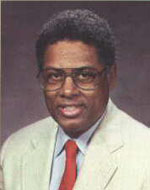Thomas Sowell
 Playing fair and square
Playing fair and square
Are you for a level playing field?
Of course you are. Everybody is. The only reason there is any controversy is because
people mean totally different things by this phrase.
Recently, the sponsors of a long-distance race in Boulder, Colorado put in some strange
rules, in the name of "a level playing field." Last year, 6 of the first 8 runners across the
finish line were from Kenya. The year before, 8 of the top 10 were from Kenya.
Kenyan long-distance runners have dominated other long-distance races in other parts of
the United States. Like other peoples from highland areas, the Kenyans tend to have
greater lung capacity, which is a valuable asset in long-distance running.
This year, the sponsors of the race in Boulder have set rules that restrict the number of
runners from foreign countries to three each.
"We hope to level the playing field," said the man in charge of the race. "It's our country,
our event, our money. American sponsors want American winners, or at least Americans
among the top finishers."
There are already too many third-party busybodies telling people how to run their
businesses, so the point here is not to question these decisions or the right of the sponsors
to make them. What is important in a broader context is what is meant by levelling the
playing field, because this phrase comes up again and again in discussions of government
policies -- and these policies are our business as citizens.
To many of us, a level playing field means that everybody plays by the same rules and is
judged by the same standards. That was the original purpose of the Civil Rights Act of
1964. People were supposed to be hired, fired or promoted "without regard" to their race.
To others, however, a level playing field means that results are to be pre-arranged by third
parties who ration out benefits to various groups. This has been the spirit behind group
preferences and quotas under the "affirmative action" policies.
We may not agree on which of these policies or approaches is best, but we should be able to
agree that they are completely different, even when they use the same words about level
playing fields.
Boulder, incidentally, is not the only place that is rigging the rules to keep the Kenyans
from running away with all the prizes in long-distance races. Various organizations in
Florida, New Jersey and Pennsylvania are doing the same.
That should raise the question as to why we are running races in the first place, except to
see who is fastest. Rigging the rules means that we don't want to reward performance but
to create a picture.
In the pious phrase of the Clinton administration, the sponsors of these races want winners
who "look like America" -- whether or not they are the fastest runners. Performance and
pre-arranged results are mutually contradictory goals -- and not just in foot races.
Professional basketball teams do not "look like America." Neither do the beer companies
that sponsor these and other sports events. Virtually all of the beer makers are of German
ancestry.
How many hockey players do you think come from Florida or California?
It may be "unfair" that people from places with frozen lakes and ponds in the winter are
more likely to grow up ice skating than people in warm climates. But this also means that
Canada and the upper midwest are likely to turn out more good hockey players than the
sunbelt does.
If you are a hockey fan, do you want to watch teams that play the game best or a team that
"looks like America"?
The things that we depend on for our daily bread and our general standard of living are
much more serious than sports. But this means that performances matter even more. How
much are we prepared to sacrifice for the sake of appearances?
Different people may give different answers. But whatever our answers, if we want honest
discussions, then we need to face the fact that performances and appearances are different
goals that are often incompatible.
Papering over these differences with mushy phrases about "a level playing field" only
confuses issues and poisons discussions.

4/19/98: Bad teachers"
4/15/98: "Clinton in Africa
"
4/13/98: "Bundling and unbundling
"
4/9/98: "Rising or falling Starr
"
4/6/98: "Was Clinton ‘vindicated'?
"
3/26/98: "Diasters -- natural and political"
3/24/98: "A pattern of behavior"
3/22/98: Innocent explanations
3/19/98: Kathleen Willey and Anita Hill
3/17/98: Search and destroy
3/12/98: Media Circus versus Justice
3/6/98: Vindication
3/3/98: Cheap Shot Time
2/26/98: The Wrong Filter
2/24/98: Trial by Media
2/20/98: Dancing Around the Realities
2/19/98: A "Do Something" War?
2/12/98: Julian Simon, combatant in a 200-year war
2/6/98: A rush to rhetoric
 Playing fair and square
Playing fair and square